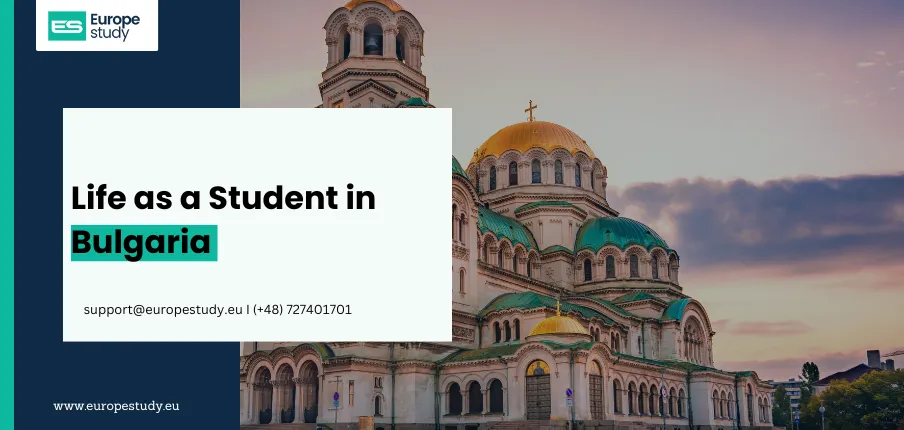
Life as a Student in Bulgaria
Bulgaria, a small yet historically rich country in Southeast Europe, is becoming an increasingly popular destination for international students. With its low cost of living, beautiful landscapes, and excellent educational institutions, Bulgaria is offering a compelling alternative to traditional study destinations. But what is it really like to live as a student in Bulgaria? Let's take a closer look at the academic, social, and cultural life that students can expect when they decide to study in this vibrant country.
Affordable Education and Living Costs
One of the most appealing factors for international students is the affordability of studying and living in Bulgaria. Tuition fees are significantly lower compared to Western Europe or the United States. For instance, while the fees for undergraduate programs typically range between €2,000 to €5,000 per year, graduate programs can cost between €2,500 and €6,000 annually. This makes Bulgaria a budget-friendly option for students who want quality education without breaking the bank.
Beyond tuition, the cost of living is also incredibly low. Students can expect to pay between €300 to €500 per month for accommodation, depending on the city and type of housing. Public transport is inexpensive, with monthly passes often costing under €20. Daily expenses for food and entertainment are manageable, meaning students can maintain a comfortable lifestyle without worrying about money.
Education System: A Blend of Tradition and Modernity
Bulgaria boasts a long-standing tradition of academic excellence, with universities that are highly respected in Europe. The University of Sofia, for example, is one of the oldest and most prestigious universities in the region. Many Bulgarian universities offer programs in English, especially in fields like medicine, engineering, business, and law, attracting students from all over the world.
The education system is rigorous, and students are expected to be highly dedicated and independent. Lectures are often theoretical, with a focus on mastering core concepts, but there is also plenty of room for practical learning through internships, research projects, and group work. Professors are typically approachable and willing to help, and many universities encourage student-led initiatives, such as clubs, societies, and cultural exchanges.
A Rich and Diverse Student Life
Bulgaria's student life is vibrant and multifaceted. Each university tends to have its own unique student culture, but there are common threads that bind the student experience across the country. One of the biggest draws for international students is the chance to explore a new culture, and Bulgaria offers a fascinating blend of Eastern and Western influences.
Cities like Sofia, Plovdiv, and Varna are buzzing with life, with cafes, restaurants, bars, and clubs that cater to students. Many students take advantage of the lively nightlife, while others enjoy exploring the numerous parks, museums, and historical sites around their university cities. Sofia, the capital, is especially popular for its mix of modern infrastructure and rich historical landmarks, like the Alexander Nevsky Cathedral and Vitosha Boulevard, a bustling shopping street.
In addition to the nightlife, there are plenty of opportunities for outdoor adventures in Bulgaria. The country is known for its stunning mountains, Black Sea coastline, and picturesque countryside. Hiking, skiing, and beach trips are popular pastimes for students looking to escape the hustle and bustle of academic life.
Cultural Diversity and Integration
Bulgaria has a relatively small but diverse international student community. Students from all over Europe, Asia, and even the Americas come to Bulgaria to study. While Bulgarian is the official language, most universities offer courses in English, making it easier for international students to adjust. However, learning a bit of Bulgarian can be helpful for socializing and fully immersing oneself in local life.
The local culture in Bulgaria is friendly and welcoming, but international students might experience some initial culture shock. The country’s history, language, and traditions are distinct, and adapting to these differences can be a fun and enriching part of the experience. Bulgarian cuisine, with its hearty dishes like banitsa (cheese pastry), shopska salad, and kavarma (stew), is a must-try. Additionally, the country’s folk music, dances, and festivals like the Kukeri (traditional masked dances) offer a unique cultural experience.
Challenges: What to Keep in Mind
While Bulgaria offers many advantages, there are a few challenges to consider. The language barrier can be tricky, especially in smaller towns and rural areas, as not everyone speaks fluent English. However, in larger cities and university towns, English is commonly spoken, especially in academic and student circles.
Public services can be slower than in Western countries, so students should be patient when dealing with bureaucracy. Moreover, while Bulgaria is safe, students should always exercise caution in larger cities and be aware of their surroundings.
Conclusion: A Memorable Student Experience
Life as a student in Bulgaria is an exciting adventure that offers a mix of affordable education, rich culture, and a chance to explore a beautiful country. From the picturesque landscapes to the vibrant student communities and the low cost of living, Bulgaria has a lot to offer those seeking an international education experience. With the right attitude and a willingness to embrace new challenges, students in Bulgaria can enjoy an enriching academic journey and create unforgettable memories.





